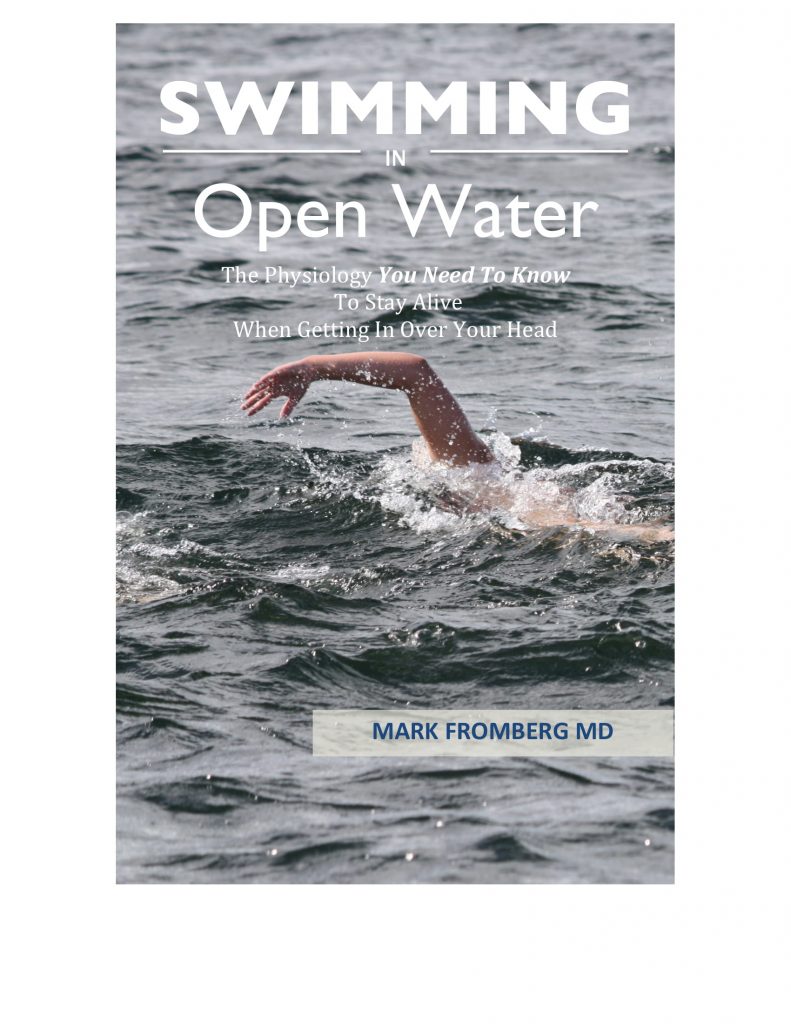Death and Cardiac Arrest in U.S. Triathlon Participants, 1985 to 2016: A Case Series. Harris KM, Cresswell LL, Haas TS, et al. October 17, 2017. Ann Intern Med. 2017;167(8):529-535. DOI: 10.7326/M17-0847.
There is no review like this.
After many years of providing medical support in Ironman medical tents, author Mark Fromberg has collected a wealth of experience of what can go wrong in open water swims and endurance events. In the last decade, he has researched all the known deaths in the swim portion of a triathlon in North America, and reviewed the medical literature on all the possible mechanisms that might put swimmers at risk in open water–some 18 different mechanisms have been elucidated. His first book outlined some of his own mis-adventures in open water.
The book also includes an extensive reference section, and builds on what you learned on the first book in the series, Swimming in Open Water: Become Less Anxious and More Confident When Getting In Over Your Head.
Available in late Spring 2018

Highlights

On Cold Water Exposure:
... to reduce the Cold Shock Response, ease your way into cool water, warm up the water in your wetsuit, consider not diving into cold water to avoid the sudden shock of the cold. Get into cool water regularly to acclimatize to it.
Avoid triggering the Diving Reflex by splashing water onto your face and neck, and avoid breath-holding while you swim (at least until you are acclimatized). And again, avoid diving into cold water, since it exposes you to sudden cold on your face, and forces you to hold your breath.

On Choking on Water:
In 1985, Japanese researchers were able to record what happens to heart rate, heart rhythm, blood pressure, respiratory efforts, and consciousness immediately after water enters the trachea. Their findings were dramatic: choking on water may be another possible potent trigger that slows down heart rate (known as vagal inhibition of the heart), a response that can occur within just seconds of aspiration (water entering the airways of the lung). This has been shown to cause an extremely slow heart rate, even stopping it completely...

On Swimming-Induced Pulmonary Edema:
SIPE has been associated with longer swims, heavy exertion, colder water, snug wetsuit use, excessive swim pre-hydration, a lack of a swim warm-up, a history of high blood pressure (hypertension), the use of anti-inflammatory medications (such as ASA), and the use of fish oil supplements. It seems to occur more often in females and thinner athletes, and is thought to occur in about 1-2% of triathletes and open water swimmers doing longer distances...
Be the first to review this book, and it will be published here!
Choose your favorite format
Have a look under the hood, or select either the eBook or the paperback version
Paperback
-
Released in May 2018. Easy to read, start almost anywhere! Tons of references to enhance your deeper understanding of your physiology in open water.
Kindle eBook
-
Instant download, works on any device with the free Kindle app